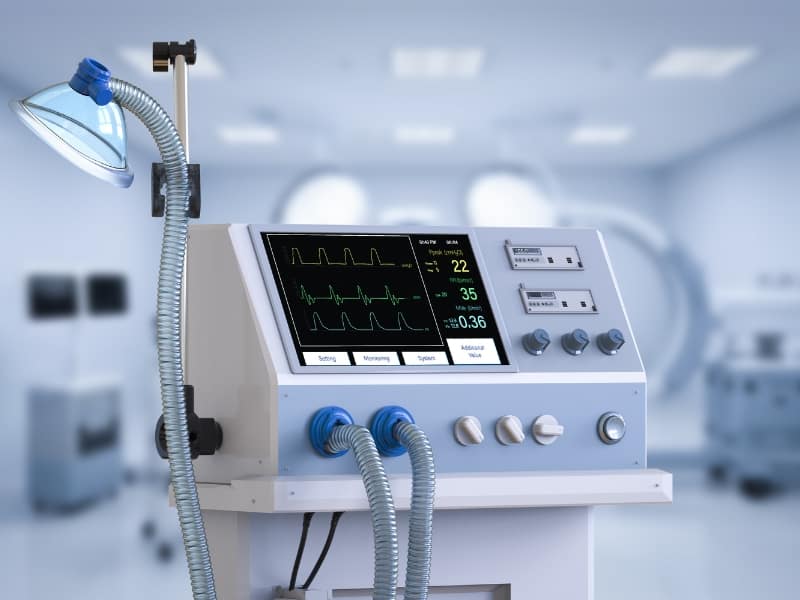When interviewing for a telemetry nurse job, the employer will want to determine whether you have the necessary knowledge and skills to fill this position successfully.
You may be asked about your experience, computer skills, and knowledge of medical terminology.
Practice answering possible questions that may come up to ensure you sound confident when answering.
Telemetry Nursing Interview Questions
You can find examples of telemetry nursing interview questions below (with sample answers).
If you want to find a telemetry nursing job, check out the job board for the latest job postings.
1. Can You Tell Me About Your Experience That Prepared You For A Telemetry Nurse Position?

The interviewer wants to hear about your previous experience and how you will relate it to the field of telemetry nursing.
In your answer, try to be specific by listing any experience you had caring for patients on heart monitors, continuous blood pressure monitoring machines, and any other life-function supporting equipment.
Answer:
“I have worked in ICU for the past four years, where I have looked after patients who were seriously ill.
I monitored and assessed the patient’s vital signs and acted on the data accordingly.
Sometimes patients that were stable would suddenly deteriorate, and I had to make decisions based on available data to prioritize tasks efficiently according to the urgency of the patient’s condition.
My experience in the ICU has prepared me to stay calm under pressure and stay focused on the patient.
I believe that I have the necessary experience to be a successful telemetry nurse.”
2. What Do You Think Are The Most Important Skills A Telemetry Nurse Should Have?

This question will help the employer determine whether you have the necessary insight and skills to be successful in this role.
In your answer, include some of your strongest skills to showcase that you are a great candidate for this position.
Answer:
“I think the most important skill for a telemetry nurse is effective communication.
In urgent situations, you must communicate with distraught patients, families, and impatient healthcare professionals to provide the best care for the patient.
You must be able to think critically to accurately assess a patient’s condition and be knowledgeable on operating the latest telemetry monitoring equipment to make informed decisions.
You also need to be very well organized.”
3. How Would You Deal With A Patient Who Is Agitated Or Upset?

Here the interviewer is looking to assess your interpersonal skills and ability to calm patients.
Your answer should show that you can be empathetic and compassionate when dealing with agitated or upset patients.
Answer:
“When my patients are upset, I remain calm and professional.
I would listen to the patient’s concerns and reassure them that their needs will be met.
I will then consult the multidisciplinary team members to collaboratively create a plan of care to meet the patient’s needs.”
4. How Would You Handle A Disagreement With A Medical Practitioner?

This is a pretty standard question, so be prepared for it.
The interviewer wants to see the strategies you use when resolving conflict situations with other multidisciplinary healthcare team members.
Answer:
“When working a shift in ICU, I noticed that a doctor was making rounds in the unit, and he skipped a patient he needed to see.
I went to let him know about the patient, and the doctor denied skipping this patient and told me he had already seen him.
I retrieved the patient’s charts to show the doctor it was not updated. The doctor realized his mistake and examined the patient.”
5. What Steps Have You Taken To Improve Your Skills As A Telemetry Nurse?

Employers want to see if you are enthusiastic about your role and want to improve your skills by continuing education and professional growth.
When preparing this answer, you can list any continuing education courses you did, any seminars you attended, or even mention goals you have set for yourself.
Answer:
“During the past year, I’ve attended a virtual conference on telemetry nursing. In my spare time, I read research articles on the latest technological developments in the field of telemetry.
I have also completed an online course in interpreting ECG patterns.
In addition, I am also a member of the American Association of Critical Care Nurses (AACN) and the Society of Critical Care Medicine (SCCM).
These organizations offer continuing education opportunities I use to stay abreast of current knowledge in the field.”
6. Tell Me About The Time You Had To Work Through A Challenging Ethical Dilemma?

When patients are critically ill, situations may arise that lead to an ethical dilemma.
The interviewer wants to assess your response to see how you handle these situations. Your answer should include the steps you took to resolve the situation.
Answer:
“Recently, there was a patient with a heart condition whose family wanted to take him home against medical advice.
His doctor felt it was too dangerous for him to be discharged. I had to weigh my professional opinion of what was best for the patient’s health against the family’s wishes.
I spoke to the family, explaining the risks of taking the patient home, and I offered them some alternative care options for the patient if he is discharged.
After I spoke to them, the family decided to follow the doctor’s orders and let the patient be cared for in the hospital.”
7. Do You Have Experience Using Medical Devices Like Ventilators, Infusion Pumps, And Monitors?

A telemetry nurse needs to know how to operate numerous medical devices.
Therefore the employer needs to know that you have the necessary knowledge of how to use these devices in patient care.
To answer this question, describe any previous experience using these medical devices. If you don’t have any experience, let the interviewer know you are willing to learn these skills.
Answer:
“Telemetry unit equipment is similar to the medical devices used in ICU.
I am familiar with using and maintaining ventilators, infusion pumps, and monitors. I can work with them and solve any problems that may arise while monitoring a patient.
In addition, I am familiar with performing routine maintenance checks to ensure that all the equipment is working properly.
I have good knowledge of safety protocols to ensure that patient safety is maintained.”
8. How Do You Ensure A Patient’s Data Is Accurately Recorded?

Accurate recording of a patient’s progress is important to prevent medico-legal mistakes.
To assure the interviewer that you can perform this part of the job accurately, describe your process to ensure your patient’s information is entered accurately.
Answer:
“I understand how important it is to enter all patient information accurately.
To do that, I always double-check my entries before submitting them.
I also try as far as possible to document in real-time to ensure that the information is complete and nothing is forgotten.
Lastly, I keep up to date with any regulations and documentation standards changes to ensure compliance.”
9. Which Medical Software Programs Have You Used In The Past?
Healthcare facilities use various medical software programs to document patients’ progress, store their details and communicate between the different departments in a hospital.
By asking this question, the interviewer wants to determine if you have any experience using the software they use at their facility.
Your answer will explain the different types of software you have experienced.
Answer:
“To document patient care and track patient’s progress, I use the Cerner EMR system daily.
To access patient records from different locations, I use EpicCare Link software. For electronic prescribing and retrieving lab test results, I use Meditech.”
10. Why Should We Hire You?
Employers ask this question to determine how you can contribute to their team.
When answering, make sure to highlight a skill or experience that makes you stand out from other candidates.
Answer:
“I believe my experience as an ICU nurse will make me a great candidate for this position. I have strong clinical skills and extensive knowledge of advanced patient care and monitoring systems.
I am also good at solving problems and have excellent communication skills. I am very organized and detail-oriented, which allows me to provide excellent care to all my patients.
Finally, I am passionate about the field of telemetry care and strive to ensure that all my patients receive the best possible care.”
Key Takeaways
Reviewing the above questions and answers will help you formulate your answers before the actual interview.
Remember that employers will be looking for candidates who can demonstrate skill in providing excellent patient care and the ability to interpret electronic equipment data.
They will avoid hiring candidates who cannot work well under pressure and have limited interpersonal skills.
